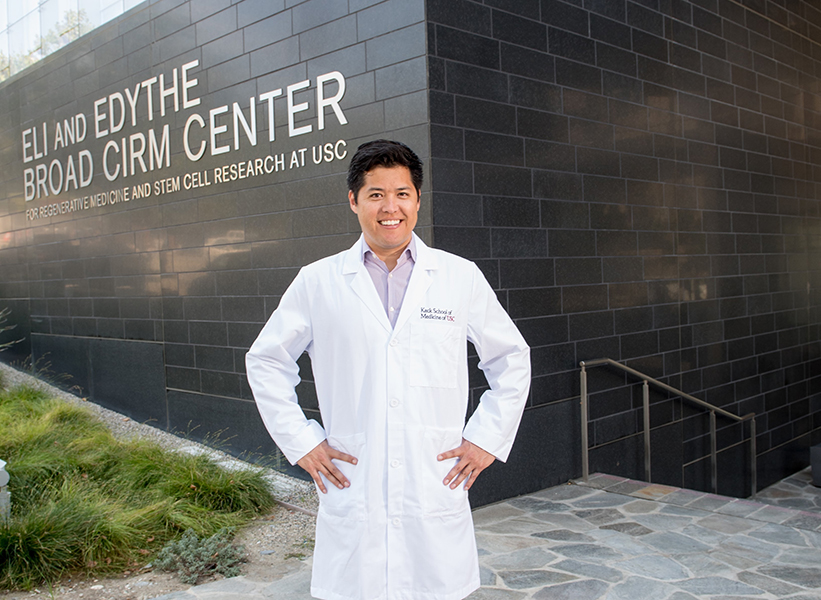
In USC’s Department of Stem Cell Biology and Regenerative Medicine, half of the faculty members are assistant professors, poised at the threshold of their careers in biomedical research. One of these promising pioneers, ALS researcher Justin Ichida, has been chosen as the first of four USC Richard N. Merkin Scholars. Ichida and his fellow scholars, yet to be named, will each receive three years of support to promote their research and facilitate collaborations with clinicians who can help transform eureka moments into patient cures.
“I’m honored to be the first Richard N. Merkin Scholar at USC. We look forward to using the generous support from the Merkin Family Foundation to identify new therapeutic strategies for patients living with ALS and other neurodegenerative diseases,” said Ichida, who is also a New York Stem Cell Foundation–Robertson Investigator, and director of the Choi Family Therapeutic Screening Facility at the Eli and Edythe Broad CIRM Center for Regenerative Medicine and Stem Cell Research at USC.
Recruited from Harvard University in 2013, Ichida has already made tremendous progress in his quest to find new treatments for ALS, a fatal neurodegenerative disease that typically strikes in middle age and leads to progressive paralysis and death within three to five years of diagnosis. Paralysis results from the degeneration of patients’ motor nerve cells, the nerve cells charged with control of voluntary (arm and leg) and involuntary (breathing) muscle movements, transmitting messages from the brain to the muscles.
In the past, studying patients’ motor nerve cells was nearly impossible, because removing these cells from the body inflicts serious nerve damage. To surmount this obstacle, Ichida pioneered a technique for directly reprogramming patients’ readily accessible skin or blood cells into motor nerve cells, which his lab can not only study, but also use to test potential drugs to treat ALS.
Drawing on these reprogrammed patient cells, Ichida’s group recently published a study in Nature Medicine describing how a gene called C9ORF72 leads to toxicity in nerve cells—causing 10 percent of all cases of ALS, as well an additional 10 percent of a related disease called frontotemporal dementia.
Ichida’s team is also identifying previously undiscovered mutations that trigger ALS in the 90 percent of patients who have no known relatives with the disease.
To translate their discoveries into patient cures, Ichida’s team is screening more than 40,000 potential drugs to see if any can stop the degeneration of reprogrammed cells from patients with ALS. They are performing this screening in collaboration with biotechnology company Icagen Corporation and machine learning company DRVision Technologies, supported by $1.5 million in federal funding from the U.S. Department of Defense. The partners have already found several promising drug leads. In addition, Dr. Ichida and collaborators are co-founders of a local biotechnology company, Acurastem, Inc., to seek to further develop therapeutic strategies.
Prior to dedicating himself to ALS research, Ichida spent his formative years in Hawaii, then ventured to the mainland to earn his bachelor of science in molecular genetics from UCLA while performing hula at venues throughout Los Angeles. After graduation, he obtained his PhD in genetics from Harvard Medical School, where he studied how life emerged from the primordial soup in the lab of Nobel Laureate Jack Szostak, and moonlighted as a guitarist in the rock bands Maniatis Maniatis and Holding Room.
“Dr. Justin Ichida was the first faculty member that I hired, shortly after my own arrival at USC,” said Andy McMahon, chair of the department of stem cell biology and regenerative medicine at USC. “As a gifted scientist, gracious colleague to his fellow faculty members and generous mentor to his students, he is ideally suited to be the first Richard N. Merkin Scholar.”
Merkin is the president and CEO of Heritage Provider Network and The Merkin Family Foundation, and a member of the Board of Overseers of the Keck School of Medicine of USC. The Heritage Provider Network and its affiliates furnish affordable quality health care to more than 700,000 patients in California, Arizona and New York.
“We are very pleased to be working with USC’s Department of Stem Cell Biology and Regenerative Medicine to support the rapid translation of lab innovations into patient treatments,” said Merkin. “I am personally thrilled that Justin Ichida has been named the first of our new class of scholars. His work addresses important issues and is already very promising. We look forward to seeing his ongoing achievements.”
